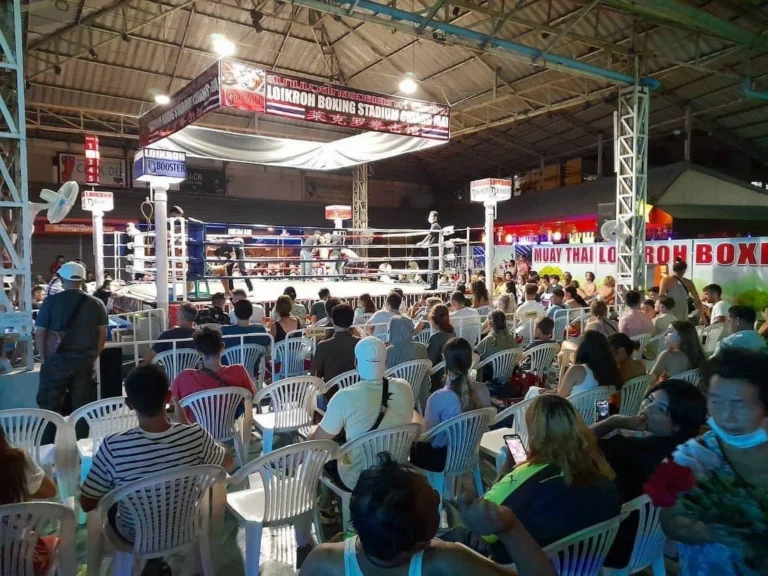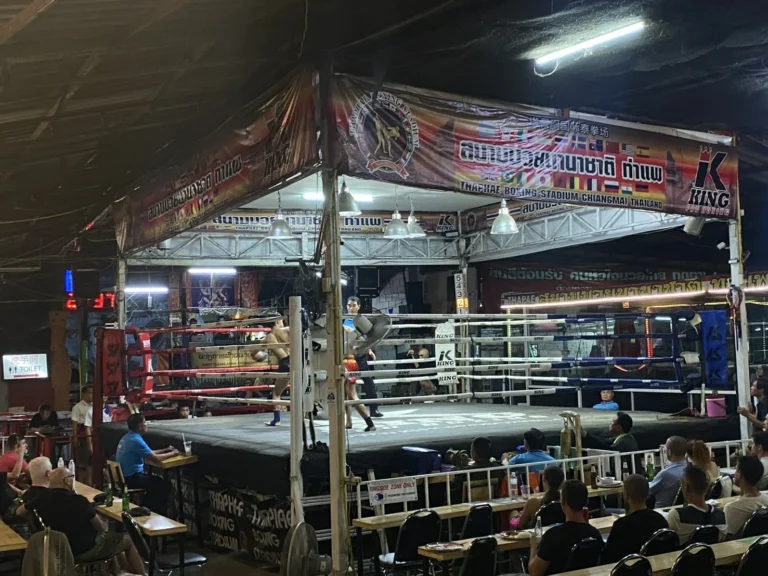So, you’ve had a taste of training Muay Thai in Thailand, perhaps even paid a visit to the lively, cultural centre of Chiang Mai. Now, the idea of staying longer – a fair bit longer – to really get stuck into the sport and the culture is calling your name.
While a tourist Visa gets you in for a limited go, it won’t cut the mustard for serious, long-term training that needs you to be at the gym consistently over months or years.
This is where the Education Visa (ED Visa) comes in handy. It’s the most common and practical way for people from overseas looking to study in Thailand for longer periods, and yes, that includes studying the ‘Art of Eight Limbs’ at approved Muay Thai camps.
Getting a Muay Thai Visa Chiang Mai specifically for training is a straightforward go if you’ve got the right information and pick the right school. This full guide will run you through all you need to know, from who’s allowed and how to apply to finding certified schools and understanding your legal duties as an ED Visa holder.
What is a Muay Thai ED Visa?
An Education Visa (Non-Immigrant ED Visa) is a type of Visa the Thai government gives to people who want to do formal education in Thailand. While folks often link it to academic studies like language schools or universities, this Visa type also covers trade training.
This includes intensive study courses like Muay Thai, provided the school running the training is officially recognised and given the tick of approval by the Ministry of Education (MOE) to sign up foreign students and issue the necessary paperwork for Visa applications.
Basically, a Muay Thai ED Visa Chiang Mai lets you live in Thailand legally for the length of your registered study course. Instead of the usual 30 or 60 days you get with tourist Visas or Visa exemptions, an ED Visa first grants you a 90-day stay permit when you arrive.
You can then extend this first 90-day period while you’re still in Thailand at a local Immigration Office. Extensions are usually given out in bits that add up to a total of one year from when you first arrived. You can often repeat this each year, potentially letting you stay continuously for several years, so long as you keep studying, show up for training as you’re meant to, and play by all the immigration rules.
It’s a popular and solid option for those fair dinkum about their training who want to steer clear of constant, annoying Visa runs and have the legal standing for a long stay focused on what they love – Muay Thai.

Eligibility Requirements for the ED Visa
To get a Chiang Mai Muay Thai Visa through the ED category, you need to meet specific rules set out by the Thai immigration authorities and the Ministry of Education. These rules are there to make sure the Visa is only used properly for educational reasons.
Who Qualifies for a Muay Thai Education Visa
Generally, to be eligible, you need to meet these points:
- Meet the age rules set by the school and the Ministry of Education. This usually starts from 12 years old, but some schools might need you to be older, especially for longer courses.
- Be formally accepted into an officially recognised Muay Thai training course at a school that’s got the tick from the Ministry of Education and is allowed to issue ED Visa paperwork.
- Have a valid passport with enough time left on it. The least you can have is 6 months from when you plan to enter, but having 12-18 months or more is a good idea to make extending your stay in Thailand easier later on.
- You might need to get a police clearance certificate or criminal record check from your home country or where you live, especially for courses over a year or if the embassy/consulate asks for it.
Documentation Needed
Getting all the right documents sorted is a really important bit of the application. While what’s needed can be a bit different depending on the exact Thai embassy or consulate you apply at and the school’s own rules, you’ll generally need:
- Your original passport.
- A filled-in Visa application form (you can usually download this from the website of the specific embassy/consulate).
- Recent passport-size photographs. Pay close attention to the details: usually 4×6 cm with a white or blue background, but *always* check what the embassy where you’re applying specifically wants.
- An official letter of acceptance from the certified Muay Thai school, saying you’re enrolled in their course.
- Official paperwork from the school. This proves the school’s got the tick from the Ministry of Education, gives details about your exact training course (what’s covered, how long it goes for, hours), and might include formal letters for the embassy/consulate.
- Proof you’ve got enough cash. You need to show you can look after yourself financially while you’re staying. This is usually done with a bank statement. A common minimum number is around 20,000 THB for one person or 40,000 THB for a family, and this money needs to have been in the account steadily for a certain time (like 30 days) before you apply for the Visa. Check the exact amount and how long the money needs to be there with the embassy/consulate.
- Possibly a criminal record check from your home country or where you legally live.
- Any other specific documents the embassy or consulate asks for where you’re putting in your application.
Financial Requirements
Like we said, showing you have enough money is a standard rule. The main point is to show the Thai government you can pay for your living costs while you’re staying there to study.
While a common figure is 20,000 THB for one person or 40,000 THB for a family, this amount can change. Some embassies might want more cash shown, or specific types of bank statements (like ones from a certain timeframe). Always check the *current* official money rule with the specific Thai embassy or consulate you’re applying at.
The Muay Thai ED Visa Application Process
Putting in for a Muay Thai ED Visa Chiang Mai needs you to be organised and pay close attention to each step. It’s a process that needs you to be patient and careful.
Step-by-step Guide to Applying
- Pick an Approved School: The first big step is to look into and pick a Muay Thai gym in Chiang Mai that is officially registered as a school and allowed by the Ministry of Education to give out ED Visa paperwork. Get in touch with gyms you’re thinking about, chat about their ED Visa courses, and get signed up, including paying any fees they need.
- Get Paperwork from the School: Once you’re signed up, the school will sort out your application with the Ministry of Education to get the okay for your study plan. After they get the nod, they’ll give you an official acceptance letter, a detailed rundown of the course, proof they’re certified by the MOE, and any other letters the embassy/consulate needs. This step involves the government doing its thing and can take a few weeks (figure on 4-6 weeks or maybe longer).
- Gather Your Own Documents: While the school is getting their paperwork ready, you should collect all your own documents. This means making sure your passport is valid, getting the right passport photos taken (usually 4×6 cm, check the specifics), getting bank statements to show your funds, and sorting out any other documents you need (like a police check if they ask for it).
- Apply at a Thai Embassy or Consulate Overseas: You generally have to apply for the *first* Non-Immigrant ED Visa when you are outside of Thailand. Usually, you can’t just switch from a tourist Visa or Visa exemption when you’re already in Thailand for the first application. You’ll need to apply at a set Thai embassy or consulate in your home country or another country where you have the right to live or are allowed to apply for a Visa. Hand in your filled-in application form, the photos needed, your passport, and all the supporting documents from both you and the school.
- Have an Interview (If Needed): Depending on where you’re from, the specific embassy/consulate, and how they do things, you might need to have an interview as part of the application process.
- Get Your Visa: If your application gets the thumbs up, the Thai embassy or consulate will put an ED Visa sticker in your passport. This Visa will say what type it is (Non-Immigrant ED) and will have a “Enter Before” date, usually good for getting into Thailand within 3 months from when they put it in. When you get to Thailand, you’ll get an initial permit to stay, usually for 90 days, stamped in your passport.
- Come into Thailand: Fly into Thailand and show your passport with the ED Visa stamp to the immigration officer when you arrive. They’ll check your Visa and stamp your passport with the date you came in and when your first 90 days is up.
Timeline Expectations
Getting the whole ED Visa application sorted, from picking and signing up at a certified school in Chiang Mai to getting the Visa stamp in your passport, usually takes anywhere from 1 to 3 months.
Things that can make this take longer include how quickly the school sorts out the Ministry of Education approval (which can take several weeks), and how long it takes the specific Thai embassy or consulate you apply at to process everything (this can vary depending on how busy they are and their ways of doing things). It’s a really good idea to get the ball rolling well before you plan to arrive, ideally 2-4 months ahead of time, so you don’t get caught out by delays and can have an easy start.
Common Pitfalls to Avoid
Knowing about common stuff-ups can help make sure your application for a Muay Thai ED Visa Chiang Mai goes smoothly:
- Applying Too Late: This is one of the most common slip-ups. Don’t hang about until your current Visa or Visa exemption is nearly done. Get your plan sorted months before.
- Missing or Wrong Documents: Make sure you have *all* the documents needed, just as the school and the embassy/consulate ask. Be super careful about the photos needed (size, background) and that your passport and bank statements are still valid.
- Picking a School That’s Not Certified: This is a big mistake. Only schools officially allowed and given the tick by the Thai Ministry of Education can legally give you the documents you need for a Non-Immigrant ED Visa to study. Double-check the school’s certified status straight with them and, if you can, through official lists.
- Not Checking the Latest Rules: Visa rules, the documents you need, and how you apply can chop and change, and they can be quite different between various Thai embassies and consulates around the world. Always check the *latest* and specific rules straight with the exact Thai embassy or consulate where you’re putting in your application. Don’t just go by stuff you find on general websites, forums, or social media that might not be up-to-date.
Approved Schools and Camps in Chiang Mai
Finding a Muay Thai gym is a piece of cake in Chiang Mai, but finding one that’s officially registered as a school with the Thai Ministry of Education and is allowed to sign up foreign students for ED Visas needs a bit more digging. Not every top Muay Thai gym in Chiang Mai can be a sponsor for an ED Visa.
When you’re hunting for a Chiang Mai Muay Thai Visa sponsor, making sure they’re officially registered and have the tick from the Ministry of Education is the most important thing to look for, even more than just how well-known the gym is for fighting.
Finding a Sponsoring Camp
Finding camps or schools in Chiang Mai that do offer ED Visa sponsorship means you’ll have to get in touch with them directly and check things out. While some well-known camps have in the past sponsored ED Visas, things can change. Some examples of camps or schools that have been linked with ED Visa courses include (Note: This list is just for showing the sorts of places, and it’s dead important that you check their current status and if they can sponsor straight with the school *and* check the latest Visa rules, as this can change. Lanna Muay Thai is one example of a gym in Chiang Mai known to offer ED Visas for training courses.):
- Lanna Muay Thai
- The Camp Muay Thai Resort and Academy
- Tiger Muay Thai Chiang Mai
- Dang Muay Thai Chiang Mai
The most reliable way to go about it is to ring or email Muay Thai training camps or schools you’re keen on. Ask them straight up if they are currently allowed by the Ministry of Education to give out the necessary paperwork for the Non-Immigrant ED Visa for Muay Thai training. Ask about how they handle ED Visa sponsorship, how long their approved courses run for, how many training hours you need each week/month, and what the training fees are. Getting a handle on the type of Muay Thai classes they offer as part of their certified course and making sure they match up with the official study rules for the Visa is key to making sure your application and stay go smoothly.
Requirements for Training Hours
Schools that sponsor ED Visas for trade training like Muay Thai usually have to provide a minimum number of supervised training or study hours each week or month. This is part of their course that’s been officially signed off. This is a rule from the Ministry of Education and immigration to make sure the student is fair dinkum about studying.
The exact number of hours needed can be different depending on the specific school and how their registered course, approved by the Ministry of Education, is set up. But you can expect to need to do anywhere from 8 to 20 hours of training each week. Turning up for training regularly and doing okay is a must and the school keeps a close eye on it, and might report your attendance to immigration.
Cost Comparison Between Programs
The total cost for getting and keeping a Muay Thai ED Visa Chiang Mai is more than just the Visa fee on its own. It’s important to think about all the costs that come with it when you’re working out your budget for training long-term:
- Tuition/Training Fees: This is usually the biggest cost by a long shot. Fees change a lot between gyms and schools based on things like how well-known they are, the gear they’ve got, how good the trainers are, what the course covers, and how long it goes for (like fees for a 6-month course compared to a 12-month one).
- Visa Application Fees: You pay this to the Thai embassy or consulate when you first apply overseas. The exact fee is different depending on the country where you’re applying and what the rules are at the time.
- School’s Admin Fee: Some schools ask for an extra fee for sorting out the ED Visa paperwork and talking to the Ministry of Education and immigration for you.
- Immigration Extension Fees: You pay a fee each year (at the moment it’s 1,900 THB, but this can change) when you ask for more time to stay at a local Immigration Office in Thailand.
- 90-Day Reporting Costs: While reporting in person or online usually doesn’t cost anything, you might pay a small fee if you choose to use someone to do it for you just to make it easier.
- Living Costs: You need to figure out how much money you’ll need each month to live in Chiang Mai. This includes where you’ll stay (rent, which changes a lot depending on the spot and type of place), food, getting around locally, bills (like power and water), and just day-to-day spending.
- Other potential costs for training: Like buying new essential Muay Thai training gear like gloves, shorts, hand wraps, and shin guards when you first start or when you need to replace them, and maybe getting medical checks if they’re needed.
When you’re checking out schools for your Muay Thai Visa Chiang Mai plans, make sure you get a clear list of all the costs involved – including training fees, Visa paperwork fees, and any other fees – so you can work out the total amount needed properly.

Visa Duration and Extensions
Knowing how long your ED Visa is first good for when you enter and how you go about getting permission to stay longer once you’re in Thailand is dead important for having a solid and legal long-term training time.
Initial Period Granted
When you come into Thailand using the Non-Immigrant ED Visa stamp you got from a Thai embassy or consulate overseas, you’ll usually be given permission to stay for the first 90 days from the day you get there. The immigration officer will stamp the date this 90-day period runs out in your passport.
Extension Requirements and Process
To stay in Thailand legally after those first 90 days, you have to apply for an extension of stay. You do this at a local Immigration Office in Thailand (the one in Chiang Mai looks after the area) *before* your current 90-day stay runs out. You can’t let your time run out before you ask for more time.
For the extension, your certified school will give you updated paperwork. This confirms you’re still signed up for the approved Muay Thai training course, shows you’ve been turning up well enough, and might include a letter talking about how you’re getting on with your training. You’ll need to fill in a form (TM.7), give them the documents they need (including copies of passport pages, photos, and the letters from the school), and pay the current fee for the extension (at the moment it’s 1,900 THB, but remember that fees can be changed by the Immigration Bureau).
If they say yes to your application, you’ll get an extension of stay stamped in your passport. While the main idea for a full-year course is usually to give you a total of 12 months legal stay from the day you first arrived, any extensions after those first 90 days might be given in shorter bits (like 60 or 90 days at a time) that all add up to the yearly total. This depends on how your course is set up and what the immigration bloke or sheila decides. You have to apply for extensions each year as long as you keep doing your registered study course.
Maximum Stay Possibilities
The ED Visa is meant to cover how long your approved study course goes for. As long as you stay formally signed up for an accredited long-term Muay Thai training course at a school that’s allowed to do it, and you keep meeting all the Visa rules and immigration needs (like making sure you turn up enough, doing okay with your training as the school asks, and following reporting rules), you can usually keep extending your ED Visa each year for the whole time your registered study course is meant to run.
This makes it a proper way to live in Thailand legally for several years straight, purely to do dedicated, full-on Muay Thai training. How long you can potentially stay depends on how long the approved course is at the certified school you picked and how committed you are to doing everything you need to.
Legal Responsibilities of an ED Visa Holder
Having a Muay Thai Visa Chiang Mai because you’re studying is a bit of a privilege, and it comes with some fair dinkum legal duties. Sticking strictly to these duties is a must to keep your legal status in Thailand and not run into trouble or fines from the immigration folks.
Attendance Requirements
Turning up for training as your certified Muay Thai school needs is not something you can just skip; it’s a dead strict rule for your ED Visa. The school has to legally keep good records of everyone from overseas on ED Visas turning up and has to report how often you show up to both the Ministry of Education and the Immigration Bureau.
If you don’t turn up for the required number of hours or classes as set out by your approved course (they often ask for about 70% to 80% attendance or a set number of hours each week) or if you’re not getting on well with your training (as the school checks), the school will tell immigration. If you don’t play by the rules like this, it will definitely mean your ED Visa gets cancelled, and you’ll have to leave the country.
Take your training and the study side of things seriously – how often you turn up and what you do are the main reasons you’re allowed to stay legally in Thailand on an ED Visa.
Reporting to Immigration (90-Day Reporting)
Anyone from overseas who’s been given permission to stay in Thailand for more than 90 days, including those on an ED Visa, has to tell the Immigration Bureau where they’re living every 90 days they’re in the country. This is officially called the “Notification of Staying Longer Than 90 Days” (most people just call it 90-day reporting or TM.47).
You have to get this report in during the right time window. This is usually from 15 days before your 90-day reporting date is due up to 7 days after that date. Ways to get the 90-day report done usually include going in person to a local immigration office (like the one in Chiang Mai), sending the report online (if you’re allowed to and the online system is working), sending it by registered mail, or sometimes getting someone else to do it for you if they’re allowed. Using someone else might cost a small fee to make it easy, but doing it in person or online is usually free.
If you don’t get your 90-day report in during the set time, it’s breaking immigration law and you could get hit with fines (right now it starts at 2,000 THB for being late, and it could be more if you keep doing it) and it might cause dramas when you try to extend your Visa or get other immigration stuff done.
TM.30 Notification of Stay
The TM.30 (Notification from the Boss of the House, Owner, or Person in Charge of Where the Foreigner Stayed) is another rule from immigration that affects people from overseas living in Thailand on long-term Visas, including the ED Visa. This rule mainly puts the job onto your landlord, the person who owns the place you’re staying at (like your rental unit or house owner), or the boss of the place you’re staying (like a hotel or guesthouse manager).
They have a legal duty to tell the local immigration folks that you’re staying at their address within 24 hours of you getting there. While you, as the person staying there, don’t usually have to fill in the TM.30 form yourself, the immigration offices often want to see proof that the TM.30 has been done for your current address when you apply for Visa extensions, permits to re-enter, or get other immigration bits sorted. It’s a good idea to know about this rule and make sure your landlord or where you’re staying knows about it and follows it. If the landlord doesn’t do the TM.30, it can sometimes cause headaches for you when you’re dealing with immigration.
Consequences of Non-Compliance
If you ignore or don’t follow any of the legal duties that come with having an ED Visa, you could face serious and potentially harsh outcomes from the Thai immigration authorities. What could happen includes:
- Fines: For being late with your 90-day reporting or if there are issues with the TM.30 notification.
- Visa Cancellation: Your ED Visa can be stopped by immigration if you don’t turn up for training enough, drop out of your course, work illegally, or do other serious things that break the rules.
- Overstay Penalties: If you stay in Thailand after the date your permit to stay runs out (which is based on your Visa stamp or last extension) without asking for more time, you are overstaying. You could get fines for every day you’re over (at the moment it’s 500 THB a day, up to a certain amount), be held at an immigration place, and possibly be sent home. Staying over, even for just a little while, can make it hard or impossible to get into Thailand again in the future.
- Blacklisting: Depending on how bad and how long you broke the rules (especially overstaying), you could be put on a list that stops you from coming back into Thailand for a set time, from one year up to forever.
Always make sure you understand and stick strictly to your Visa rules, what the certified school needs from you, and all the Thai immigration laws and regulations. This is the way to have a smooth, legal, and ongoing long-term stay for your training in Chiang Mai.

Alternative Visa Options for Extended Training
While the ED Visa is the most direct and usually the best way for people whose main aim is serious long-term Muay Thai training in Thailand, it’s good to know about other types of Visas that might let you stay longer.
But, these other options are mainly for different things and might not be as focused on *studying* Muay Thai, or they have different rules and costs.
Tourist Visa Comparison
A regular tourist Visa (usually gives you 60 days to stay, which you can often add another 30 days onto at an immigration office for a total of 90) or just coming in without a Visa (usually gives you 30 or 45 days at first, which you can add 30 days onto) is perfectly fine for short training holidays or trying it out for a few weeks or a couple of months.
However, these options aren’t meant for staying for many months or for signing up for long study courses for Visa reasons. Relying on doing lots of “Visa runs” (leaving and coming back into the country) to string together tourist stays isn’t really what immigration wants, and it’s not a steady, trustworthy, or legal way to live there long-term just for training.
Destination Thailand Visa (DTV)
A newer Visa type brought in by the Thai government is the Destination Thailand Visa (DTV). This Visa is for people visiting for a longer time, folks who work online (digital nomads), and people who want to do things like learn Muay Thai, take cooking classes, do sports training ( Muay Thai included), or get medical help.
The DTV lets you stay for up to 180 days at first, and you can potentially add another 180 days onto that, meaning you could possibly stay for a whole year. A key difference from the ED Visa is that the DTV isn’t tied to signing up for a specific course at a school that’s got the Ministry of Education’s tick with strict rules about turning up, the way the ED Visa is. It gives you more wiggle room in how you plan your time and training.
But, the DTV has different requirements to be eligible, different ways of applying, and different perks compared to the ED Visa. Whether it’s the right fit depends on your own situation, what you want to achieve long-term, and how you’re doing financially. It’s an easier option than a standard tourist Visa for staying longer to do things like training, but it’s not a formal “study” Visa in the same strict way the ED Visa is.
Thailand Elite Visa for Long-Term Stays
The Thailand Elite Visa programme, run by Thailand Privilege Card Company Limited, offers different ways to join that give you a long-term stay in Thailand, from 5 to 20 years depending on which one you pick. This type of Visa comes with big benefits for people with a bit of cash, like being able to go in and out of Thailand as much as you like, getting through immigration quicker at airports, and getting help with things.
It costs a fair bit more than the ED Visa, with the price to join starting from 500,000 THB and going up to millions of THB. The main plus for someone keen on Muay Thai is that the Elite Visa *doesn’t* need you to study or do any specific activity like training to keep living there. You’re legally allowed to live in Thailand for as long as you’re a member.
While you have an Elite Visa, you can train Muay Thai at any gym you fancy, for however many hours you like, without any Visa rules about turning up or studying linked to a school. This option gives you the most freedom and makes staying long-term easy if you want to train, but it comes with a hefty price tag that only works for people with plenty of dough.
Other Options for Extended Training
Other types of non-immigrant Visas, like Business Visas (Non-Immigrant B) or Retirement Visas (Non-Immigrant O-A/O-X), usually don’t fit the bill for people whose only main reason for staying in Thailand is to train Muay Thai as a student. Business Visas are normally for folks working in Thailand (which means you’d need permission to work), and Retirement Visas are for older people who meet certain money rules.
Unless your training is directly tied to a job in Thailand (like a trainer from overseas hired by a Thai gym) or you’re old enough to get a retirement Visa, these types aren’t suitable. For most students or keen beans whose main reason for staying is just long-term training, the ED Visa, the newer DTV, or possibly the Elite Visa are the main proper long-term choices to think about.
Real Student Experiences (Short Stories)
Thousands of people from other countries successfully use the ED Visa path to follow their passion for Muay Thai with long-term training in Thailand, especially in popular spots like Chiang Mai. The ED Visa helps you really get amongst both the sport and the local culture, which means you can keep getting better over time.
Here are a couple of made-up examples showing how the ED Visa can help with serious training aims, highlighting the good bit about being able to stay there legally and continuously:
Short Story 1: Sarah from the UK first came to Chiang Mai on a tourist Visa for a month-long Muay Thai training holiday. She was really impressed by how good the teaching was and the friendly vibe at the gym she picked. Realising she wanted to spend a lot longer training to seriously improve her skills and maybe even have a go at local fights, she looked into certified gyms that offered the ED Visa. After finding a suitable course that the MOE had signed off on, she did all the sign-up stuff, went back to the UK to put in for her ED Visa at the Thai embassy, and was back in Chiang Mai within two months with her new Visa sorted.
This meant she could live there long-term and train hard twice a day, six days a week, without having to stress about Visa runs. By making sure she turned up as the school needed and stuck to the tough training plan that her ED Visa allowed, she got heaps better with her technique, strength, and fitness over the year, hitting the training goals she set for herself at the start.
Short Story 2: David from Canada was already a decent amateur Muay Thai fighter who wanted to spend a full year training specifically to get some real fighting time in Thailand. He found a well-known camp in Chiang Mai that was good for training fighters and also had the tick from the Ministry of Education to sponsor ED Visas. By sorting out the ED Visa, David was able to legally live in Thailand for the whole time he was doing his full-on fighter training course, getting rid of the worry and hassle of constant border runs that shorter Visas would need.
He went all in with his tough training plan, turning up for all the daily classes and sparring sessions that were part of his Visa rules. Him being there all the time and training hard, which the ED Visa made possible, ended up giving him chances to fight in local Muay Thai fights at the stadiums in Chiang Mai. This let him get valuable experience fighting in the home of the sport and work towards what he wanted to achieve as a fighter.
Recent Policy Changes
Thai immigration rules and Visa guidelines don’t stay the same; they can change from time to time based on government decisions, how the economy is going, and other reasons. It’s absolutely crucial for anyone planning to apply for a Muay Thai Visa Chiang Mai to get the very latest and correct information straight from official places before you start your application or make solid travel plans.
Going by old information you find on forums, social media groups, or general websites (even if they mean well) is a common and could be a costly stuff-up. It can cause delays, mean your application gets knocked back, or lead to issues when you arrive.
For example, as of 2025-05-05, there might have been updates about specific things needed for the Non-Immigrant ED Visa. This could include changes to the minimum cash needed to show you have enough funds, tweaks to the exact list of documents needed from schools that are sponsoring (which might change based on new Ministry of Education rules), different ways to apply or different documents needed depending on where you’re from, or the official start and details of new Visa types like the Destination Thailand Visa (DTV) which could offer other ways to stay long-term if you’re keen on things like training.
To make sure you have the most correct and up-to-date stuff, you should always check the official website of the specific Thai Embassy or Consulate where you plan to apply for the first Visa. This is the proper place to get the rules for applying from overseas. Plus, keep in close and direct touch with the approved, certified school in Chiang Mai you’re planning to sign up with. They work straight with the Ministry of Education and the Immigration Bureau and should have the very latest information about the paperwork and steps needed for ED Visa sponsorship and keeping your status all good while you’re training in Thailand.

Frequently Asked Questions
How much does a Muay Thai ED Visa in Chiang Mai cost?
The total cost for a Muay Thai ED Visa is made up of a few different things. The biggest cost is usually the school’s fees for training or tuition for the long course, which can be very different depending on the school, how long the course is, and how full-on it is. On top of that, there’s the first fee for the Visa application you pay at the Thai embassy/consulate overseas (this fee changes depending on the country where you apply). Some schools might also ask for a fee for sorting out the Visa paperwork. Lastly, there’s a fee each year you extend your stay at Thai Immigration (right now it’s 1,900 THB per extension), plus small costs for 90-day reporting if you don’t do it yourself in person or online. You also need to plan separately for all your costs for living in Chiang Mai.
Can I work in Thailand on a Muay Thai ED Visa?
Nah, it’s dead against the rules to work in Thailand when you have a Non-Immigrant ED Visa. This type of Visa is only given out for studying or education. Doing any sort of paid work, whether it’s for a Thai boss or working from Thailand for a company overseas, or doing freelance gigs, is against the law. Working on an ED Visa can lead to big fines from Thai immigration, like your Visa being stopped straight away, hefty fines, being sent home, and being put on a list that stops you from coming into Thailand again later on. If you’re planning to work in Thailand, you need to get the right type of Visa, like a Non-Immigrant B Visa, and make sure you’ve got a valid permit to work before you start any job.
How long does it take to get the initial ED Visa for Muay Thai training?
Getting the first Non-Immigrant ED Visa for Muay Thai training sorted, from signing up at a certified school in Chiang Mai to getting the Visa sticker in your passport, usually takes anywhere from 1 to 3 months. This includes the time the school needs to sort out your sign-up and get the necessary paperwork from the Ministry of Education, plus the time the specific Thai embassy or consulate takes to go through your application. How long it takes can change based on how quick the school and the embassy are. To make sure you get your Visa in time for when you want to travel, it’s a really good idea to start the whole process well before, ideally 2 to 4 months before you plan to get to Thailand.
Do I have to leave Thailand to apply for the initial Muay Thai ED Visa?
Yeah, in most usual cases, you have to apply for the *first* Non-Immigrant ED Visa at a Thai Embassy or Consulate that’s *outside* of Thailand. You generally can’t just switch from a tourist Visa, a Visa exemption stamp, or most other short stays to an ED Visa when you’re already in Thailand for the very first time. While there might be a few exceptions or specific steps for changing from certain *other* types of non-immigrant Visas when you’re already in the country (depends on where you’re from and what your current Visa is), the standard and required way for most people wanting an ED Visa to study is to apply from overseas before you come into Thailand.
Is attendance mandatory at the Muay Thai school for the ED Visa?
Strewth, yes, turning up for training as your certified Muay Thai school needs is absolutely a must-do to keep your ED Visa valid. The ED Visa is given so you can study, and both your school and the Thai immigration authorities need proof that you’re fair dinkum attending the course you signed up for. Schools legally have to keep proper records of how often you show up and report it to the Ministry of Education and Immigration. If you don’t turn up for the right number of hours or classes as set out by your approved course (they often ask for about 70% to 80% attendance), it’s seen as breaking your Visa rules and will most likely mean immigration stops your Muay Thai Visa Chiang Mai.
What documents does the school provide for the ED Visa application?
A certified Muay Thai school that’s allowed by the Ministry of Education to sponsor ED Visas will give you important paperwork needed for your first ED Visa application at a Thai embassy or consulate overseas. These documents, which the school sorts out and often need the MOE’s okay, usually include an official letter saying you’ve been accepted and signed up for a specific long Muay Thai training course, a detailed outline or rundown of what’s covered in the course and the timetable, proof of the school’s official certification by the Ministry of Education, and sometimes other formal letters for the specific Thai Embassy or Consulate where you’ll apply. This paperwork from the school is dead important for your Chiang Mai Muay Thai Visa application pack.
Can I change Muay Thai schools in Chiang Mai on an ED Visa?
Changing schools while you have an ED Visa in Thailand is a tricky business and usually not a simple thing to do. Your ED Visa is linked to the exact certified school that sponsored your application and whose study course you’re doing. If you want to swap schools, it usually means stopping your current ED Visa that’s tied to the first school and then putting in for a new ED Visa sponsored by the new school you want to go to. This often means you have to leave Thailand and apply for the new Visa from overseas again, just like you did the first time. It’s not normally an easy swap within the country between schools. So, it’s a really good idea to do plenty of looking into it and pick a reliable, certified school you’re happy to stick with for the whole time you plan to train in Chiang Mai before you go for the first ED Visa, so you don’t run into these big hassles.
What is the 90-day reporting requirement for an ED Visa?
The 90-day reporting is a must-do rule from immigration for everyone from overseas who’s been given permission to stay in Thailand for more than 90 days, which includes those on an ED Visa. Every 90 days you stay in Thailand, you have to legally tell the Immigration Bureau where you are currently living. This report, known as the Notification of Staying Longer Than 90 Days (TM.47), must be handed in during a set time: usually from 15 days before your 90-day reporting date is due up to 7 days after that date. You can do the 90-day report by going in person to a local immigration office, using the online system (if you’re allowed and it’s working), or sending it by registered mail. This is a separate thing from asking for your Visa to be extended each year, even though the time you have to do your first 90-day report might happen at the same time you ask for your first extension after the initial 90-day stamp.
Is the TM.30 notification related to the ED Visa?
Yeah, the TM.30 (Telling Them Where a Foreigner Is Staying) is linked to you being in Thailand on any long-term Visa, including the ED Visa, because it’s about where you live. While the main legal job of filling in the TM.30 is for your landlord, the person who owns the place you’re staying at (like someone who owns a place you rent), or the boss of where you’re staying (like a hotel manager), they have to tell the local immigration folks you’re there within 24 hours of you arriving at that place.
Even though you, as the person staying there, don’t usually fill in the TM.30 form yourself, the immigration offices often want proof that the TM.30 has been properly done for your current place when you ask for Visa extensions, permits to come back into the country, or get other immigration things sorted. It’s important to know about this rule and make sure your landlord or where you’re staying gets it and follows it, because problems with the TM.30 can sometimes cause headaches for you when you deal with immigration.
Conclusion
Getting a Muay Thai Visa Chiang Mai using the Education Visa system is a fantastic and proper way to spend a fair bit of time training, really get into the rich Thai culture, and enjoy staying longer in the lively city of Chiang Mai without the bother and worry of doing heaps of border runs.
While getting it sorted needs careful planning, being organised with the right paperwork, and most importantly, picking the right certified school, it’s a common way for keen people from all over the world looking for serious long-term training where Muay Thai started.
Remember to always check the latest rules straight with official places like the specific Thai Embassy or Consulate where you plan to apply and the certified school you’re planning to join, because immigration rules can and do change. Picking a well-known place that’s officially allowed by the Ministry of Education is the first and most important step.
Once you’re in Thailand, make sure you stick to all your Visa duties properly, especially turning up for your training course as you’re meant to, doing the required 90-day reporting, and making sure your landlord does the TM.30 notification. With the right groundwork, being serious about your studies, and following the rules, your dream of a long Muay Thai training trip in Chiang Mai can really happen.
Ready to take the next step to reach your long-term training goals in Chiang Mai? Start looking into certified Muay Thai schools and the ED Visa courses they offer today!
Related Guides & Resources:
- Planning Your Training: Finding the Right Muay Thai Training Camp in Chiang Mai
- Types of Training: Explore Muay Thai Classes in Chiang Mai
- Short Stays vs. Long Stays: Muay Thai Options for Tourists in Chiang Mai
- What You Need: Essential Muay Thai Training Gear
- Experience the Culture: Where to Watch Muay Thai in Chiang Mai




